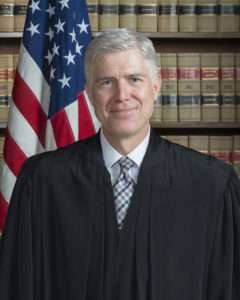The Volokh Conspiracy
Mostly law professors | Sometimes contrarian | Often libertarian | Always independent
Neil Gorsuch on Expanding Access to Legal Services
In an op ed coauthored with former Colorado state supreme court justice Rebecca Love Kourlis, he outlines some ways to make legal services more affordable for the poor and lower middle class.

In a recent USA Today op ed coauthored with former Colorado Supreme Court justice Rebecca Love Kourlis, conservative Supreme Court Justice Neil Gorsuch takes up a cause traditionally associated with the political left: expanding access to legal services. As they explain, we can do much to make legal services more affordable for the poor and lower middle class by breaking down barriers to entry into the market:
Sooner or later, almost all of us face a need for legal advice. Maybe we want a will drafted, find ourselves in a divorce, or disagree with our landlord about a lease. Property disputes, tax questions, automobile accidents: The list goes on. And it's no secret that, even to accomplish the simplest task, hiring a lawyer is expensive — too expensive.
As a result, more and more people today find themselves forced to go it alone in court. A national study in 2015 found that in 76% of civil cases, at least one party was self-represented…..
As lawyers and judges, we cannot ignore that the problem is partly of our own making. Consider two examples. First, lawyers have historically enjoyed the unusual privilege of regulating themselves, under the authority of state supreme courts. In most states, the profession has used this privilege to erect rules allowing only lawyers to provide "legal services"— no matter how basic the job may be….
Second, the profession has generally insulated the legal industry from market competition. Only lawyers may own or invest in law firms. This restriction on capital investment reduces the number of market participants, which in turn prevents competition from reducing costs. At your local superstore you may be able to find tax-preparation services or an eye doctor, but you will find no help there for even the simplest legal chore. Both of these longstanding practices protect the entrenched interests of the legal profession at the expense of the clients we are meant to serve..
Fortunately, some states are now trying to address these problems. Just last month, the supreme courts of both Utah and Arizona took bold steps to increase access to justice. Beginning in 2021, Arizona will recognize a new category of trained, non-lawyer legal professionals who will now be permitted to represent clients in various areas of the law…. Utah took similar steps as part of a two-year pilot program.
Gorsuch and Kourlis are right: Protectionist measures established at the behest of the organized legal profession have too often insulated lawyers from competition. As a result, they have made even basic legal services so expensive that many Americans often cannot afford them.
The reforms they propose are not new. Economists and legal scholars have long advocated reducing barriers to entry into the legal services market and deregulating the legal profession in ways that would increase competition. We can also reduce the cost of legal services by allowing corporate entities to provide legal services, as advocated by legal scholar Gillian Hadfield. This would be an extension of the Arizona-Utah reforms mentioned by Gorsuch and Kourlis, which would allow non-lawyers to have ownership stakes in law firms. The idea that we must bar non-lawyers and corporations from controlling providers of legal services because otherwise the ethics of lawyers might be "corrupted" is silly. For my part, I have argued for reducing barriers to entry by abolishing the requirement of taking a bar exam, and reducing the number of years would-be lawyers must spend in law school. Many of the reform proposals advanced by scholars actually go much further than the more modest measures Gorsuch and Kourlis endorse.
While Gorsuch and Kourlis' op ed doesn't break much new ground, they have provided a valuable service by giving these ideas such a high-profile endorsement. Hopefully, the support of a prominent Supreme Court justice will help break down the resistance to reform of many in the organized legal profession. Gorsuch's endorsement might also lead more people on the political right to take this important issue seriously.
The sorts of measures Gorsuch and Kourlis advocate are not fool-proof. In some cases, there will be devils lurking in the details. For example, allowing non-lawyers to provide some types of legal services won't help much if the licensing process they have to go through is so onerous, that very few people will actually qualify. Nonetheless, these ideas are worth pursuing. Gorsuch and Kourlis rightly point out that similar reforms have worked well in the UK and elsewhere.
Gorsuch is not the first current Supreme Court Justice to call attention to the need to expand access to legal services. In 2016, Justice Sonia Sotomayor addressed the same issue, and advocated imposing "forced labor" (her term, not mine) on lawyers to require them to provide free services to the poor. While Sotomayor was right to focus on this important problem, her proposed solution has very serious moral and practical flaws, which I summarized here. Gorsuch and Kourlis' approach is more promising. We should not impose forced labor on lawyers - or anyone else. But we should expose them to greater competition.


Show Comments (49)